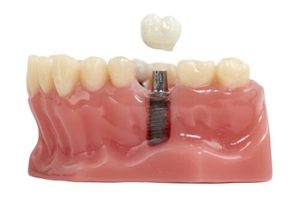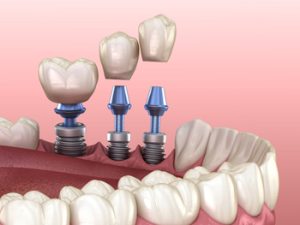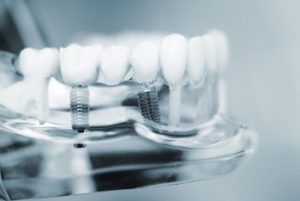Considering a single tooth implant? The decision to invest in a dental implant is not only a commitment to enhancing your smile but also an important financial decision. In this blog post, we will explore the various factors that can influence the cost of a single tooth implant. By understanding these elements, you can make a knowledgeable decision that balances quality and affordability.
What Is a Single Tooth Implant?
A single tooth implant involves the insertion of a titanium post into the jawbone, replacing the root of a missing tooth. This type of implant is specifically designed to support a single dental crown, tailored to match the surrounding teeth for a natural appearance. Different materials, such as zirconia or ceramic, can be used for the crown depending on aesthetic needs and durability requirements.
What Is the Cost of Single Tooth Implants?
The cost of a single tooth implant can start from $3,000, but several factors can influence the final price. These include the material used for the implant, the complexity of the individual case, and any additional procedures required, such as bone grafting. It’s essential to consult with a dental practitioner to get a detailed estimate based on your distinct needs.
What Determines the Price of a Single Tooth Implant?
Determining the cost of a single tooth implant involves a multifaceted approach, as several factors contribute to the final price. Here, we will explore the various elements that influence the cost of dental implants, ensuring you have a clear understanding of what to expect when considering this dental procedure.
Material and Type of Implant
Complexity of the Dental Procedure
The complexity of your dental needs plays a crucial role in determining dental implants cost. If there is considerable bone loss, a bone graft might be necessary before placing the implant. Additionally, the need for sinus lifts or the complexity of the implant placement can add to the overall cost due to the extra time and materials needed for the procedure.
Geographic Location
The location of the dental practice is another critical factor. Dental implant costs can vary significantly between different regions and countries due to differences in the cost of living, operational expenses of the dental practice, and local market conditions.
Experience and Expertise of the Dentist
The qualifications and experience of the dentist also play a crucial role in the single tooth implant cost. Highly experienced dental professionals who are well-regarded in the field of implantology typically charge more for their services. This premium is often reflective of their advanced training and the higher likelihood of successful outcomes.
Additional Dental Work Required
In some cases, additional preparatory dental work, such as extractions of damaged teeth or treatment of existing gum disease, may be required. These procedures will add to the overall cost of the implant process.
Lab Fees and Technology Used
The technology used for planning and placing implants can vary. Practices that use advanced imaging and surgical planning technology, such as 3D scans and computer-guided implant surgery, might offer more precise placements but at a higher dental implant cost. Additionally, the fees charged by the dental laboratories that fabricate the custom implants and crowns can vary based on the quality and experience of their services.
Making an Informed Decision
When considering a single tooth implant, it’s vital to look beyond just the initial quote and understand the full scope of the investment you are making in your oral health. Choosing a dental provider that offers a good balance between cost and quality of care can ensure that you achieve the best possible outcome for your dental implant.
The cost of single tooth implants is influenced by a range of factors, from the materials used to the expertise of the dentist and the specific dental needs of the patient. By understanding these elements, you can better navigate the process and make informed decisions about your dental care.
What Steps Are Involved in Receiving a Single Dental Implant?
Initial Consultation and Assessment
Personalised Treatment Planning: If you are deemed a suitable candidate, the dentist will then outline a personalised treatment plan. This plan will detail the expected timeline and steps of the dental implant procedure, including pre-surgical preparations and recovery expectations. This phase is also when the dental implant cost is discussed, giving you a clear understanding of the financial commitment involved.
Pre-Surgical Preparation
In cases where there is insufficient jawbone to support an implant, bone grafting may be required. This preparatory procedure involves augmenting the jawbone with graft material to enhance its volume and density, creating a more suitable site for the implant. The graft needs time to integrate with your natural bone, extending the preparation phase by a few months.
The Dental Implant Surgery
Implant Placement: The actual implant surgery is a precise procedure typically performed under local anaesthesia, although sedation options may be available for those who experience dental anxiety. The process starts with a small incision in the gum to expose the jawbone. Subsequently, a specialised drill creates a space in the bone where the titanium implant, essentially a small screw, is carefully inserted.
Healing and Integration: Following the placement of the titanium post, the site is allowed to heal in a process known as osseointegration. This critical phase involves the implant integrating with the jawbone, providing a stable anchor for the new tooth. It typically lasts several months, during which careful monitoring is essential to ensure successful integration and healing.
Attaching the Abutment and Dental Crown
Abutment Installation: Once the implant has properly fused with the jawbone, an abutment is attached to the implant post. This step might involve a minor surgical procedure to reopen the gum and access the implant. The abutment functions as a link between the implant and the crown, and it will be left to heal before the final crown is placed.
Crown Fitting: The final step in the dental implant process is fitting the crown, which is the visible part of the implant designed to look like a natural tooth. The crown is tailor-made to match the colour and shape of your surrounding natural teeth, ensuring it blends seamlessly into your smile. Precise adjustments are made to ensure optimal fit and function.
Post-operative care and Long-Term Maintenance
Post-operative care is crucial for the success of your dental implant. To keep your implant in optimal condition, consistent brushing, flossing, and regular oral check-ups are important. These appointments let your dentist monitor the implant and the surrounding gum and bone health.
Embarking on the procedure for a single dental implant involves careful planning and consideration of various stages, from initial assessment through to post-operative care. By choosing a skilled implant dentist and following the recommended care regimen, you can enjoy the long-term benefits of a restored smile and enhanced oral health, making the investment in a single dental implant a wise choice for those missing a tooth.
What Are the Health Benefits of Tooth Implants?
Tooth implants offer more than just a cosmetic fix; they provide significant health benefits that can improve overall quality of life. Understanding these advantages can help individuals see the value beyond the aesthetics, highlighting how implants contribute to overall wellness.
Preventing Bone Loss: The absence of teeth can result in the gradual deterioration of the jawbone in the affected area due to insufficient stimulation. Dental implants imitate the role of natural tooth roots by providing the necessary stimulation to the bone, helping to prevent bone loss and sustain the natural structure of the jaw. This is critical for both the appearance of the face and the structural integrity of the jawbone.
Maintaining Gum Health: Dental implants help maintain healthy gums by filling the gaps left by missing teeth, which can often become traps for food and bacteria, leading to gum disease. The design of implants facilitates easier cleaning and access between teeth, promoting better oral hygiene.
Protecting Adjacent Teeth: Unlike traditional bridges, dental implants do not require altering the adjacent original teeth. This means that the remaining teeth retain their strength and integrity, which is beneficial for long-term dental health. By avoiding the need to grind down neighbouring teeth for bridge placement, implants preserve more of the individual’s natural tooth structure.
Restoring Chewing Function: One of the most significant health benefits of dental implants is the restoration of chewing function. Those with missing teeth or uncomfortable dentures may find it hard to chew effectively, impacting their overall nutrition. Implants serve like natural teeth, enhancing chewing capability and supporting a more comprehensive range of nutrients.
This is particularly important for the elderly, who may already be experiencing nutritional deficiencies.
Boosting Confidence and Quality of Life: The psychological impact of missing teeth can be profound. Many individuals with missing teeth suffer from low self-esteem and may avoid social interactions or certain activities. Dental implants provide a durable and visually appealing solution, which can significantly boost a person’s confidence and improve their overall quality of life.
Reducing Anxiety Associated with Dentures: For those accustomed to the challenges of dentures, including slipping and discomfort, dental implants can offer a sense of security. Implants are securely anchored and do not move, eliminating the fears associated with dentures dislodging or falling out during speech or eating.
Endurance and Practicality: Designed for long-term use, tooth implants can endure for a lifetime with the right upkeep, making them a superior choice compared to dentures or bridges that generally need periodic replacements.
The durability of implants reduces the need for future dental work, which can be both costly and physically demanding.
Reducing the Risk of Oral Diseases: By allowing for better oral hygiene and providing stability in the mouth, implants reduce the risk of conditions like periodontal disease, which is associated with other health issues such as diabetes. The ability to clean implants just like natural teeth lowers the risk of chronic infections and inflammation.
Dental implants offer numerous health benefits that extend far beyond their immediate functional and aesthetic purposes. They contribute significantly to the preservation of oral structures, enhance nutritional intake, support emotional well-being, and promote long-term oral and general health. Considering dental implants is not just about restoring a smile; it’s about enhancing your overall health and well-being.
What Are the Best Practices for Maintaining Your Dental Implants?
Ensuring the functionality of your dental implants involves a commitment to meticulous care and maintenance. Just like natural teeth, implants require consistent and proper care to remain in top condition. Here’s how to maintain your dental implants effectively.
Daily Cleaning and Care
Regular Brushing and Flossing: Maintaining dental implants starts with the basics: regular brushing and flossing. Use a soft toothbrush to clean around each implant, paying close attention to all sides of the implant crown. It’s advisable to brush at least twice every day to eliminate plaque and prevent the buildup of bacteria.
Using Interdental Brushes and Floss: For areas that are hard to reach with a regular toothbrush, interdental brushes are extremely useful. These are especially effective around the abutment and crown. Flossing is also crucial; use unwaxed tape or implant-specific floss to clean around the tooth implant and under the crown where regular brushing can’t reach. This helps prevent peri-implantitis, a condition similar to gum disease that can affect implant health.
Professional Dental Check-Ups
Regular Dental Visits: Regular dental visits play a crucial role in the sustained success of your implants. Your dentist will use these check-ups to review the condition of the implants, crowns, and the surrounding gum tissue.
They can also perform professional cleanings that reach deeper than your daily routine, ensuring that any hidden problems are addressed promptly.
Professional Cleanings: Professional cleaning techniques such as scaling and root planing might be recommended to keep the base of the implants clean and free from potential infection. These procedures help maintain the health of the gums and ensure that the implant site remains intact and infection-free.
Monitoring for Any Changes
Watch for Signs of Trouble: Stay vigilant for signs of discomfort, inflammation, or unusual movement in your implant. Any persistent discomfort or visible changes in the implant area should prompt a visit to the dentist. Early recognition of potential issues can make a considerable difference in the treatment outcomes.
Responding to Sensitivity: If you experience increased sensitivity around the implant site, discuss it with your dentist. This could be a sign of gum recession or infection that needs immediate attention.
Lifestyle Considerations
Avoid Hard Foods: While dental implants are durable, they are not indestructible. Avoid chewing excessively hard foods, which can damage the crown—the visible part of the implant. Sticking to a diet that’s friendly to your implants can prevent unnecessary wear and tear.
Prevent Damage from Grinding: If you frequently grind or clench your teeth, discuss with your dentist the possibility of using a custom night guard. This can help protect both your natural teeth and implants from excessive wear and stress, thereby prolonging their life.
By following these best practices, you can ensure that your dental implants serve their purpose effectively for many years. Remember, the key to successful implant maintenance is a combination of home care, professional dental support, and making mindful lifestyle choices. These steps will help you maintain not just the health of your implants but also your overall oral hygiene.
Step Towards Recovery: Address Missing Teeth Today
Navigating the cost of single tooth implants involves understanding the full scope of dental procedures available. Whether it’s a single implant or full mouth dental implants, each option offers a solution for missing teeth. Ready to take the next step? Call Casey Dentists at 07 4801 7035 to explore your options and restore your smile today.
Note: Any surgical or invasive procedure carries risks. Before proceeding, you should seek a second opinion from an appropriately qualified health practitioner.
References
https://www.healthline.com/health/dental-and-oral-health/benefits-of-dental-implants
https://dentistry.uic.edu/patients/dental-services/general-family-dentistry/guide-to-dental-implants-a-popular-option-for-tooth-replacement/



